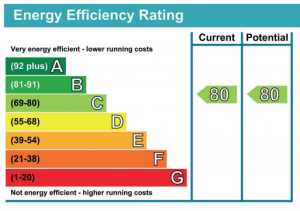Share post:
(Article updated June 2025)
Obtaining an Energy Performance Certificate (EPC) remains a legal requirement in London, especially for those planning to sell or rent their property anywhere in England, Northern Ireland or Wales.
As a landlord, it’s your responsibility to comply with the rules and keep your property’s energy ratings high. Ensure you have a valid EPC so you can keep operating your rental property. More than being a compliance requirement, EPCs can also improve your property’s energy efficiency and reduce energy costs, thereby increasing your rental income.
In this article, you’ll learn more about Energy Performance Certificates and how landlords and properties benefit from them. You’ll discover why this is necessary and how you can implement energy efficiency improvements in your property to get a better EPC rate.
What is an Energy Performance Certificate (EPC)?
An Energy Performance Certificate or EPC is a document that shows the energy efficiency rating of private and public buildings. This is also necessary for listed buildings or properties before they can be sold or rented. Potential buyers (or their estate agent representative) will request this from sellers.
EPCs will show two performance ratings.
- Letter Grade. This rating is from A (most efficient) to G (least efficient). Most properties in England have an EPC rating of C or D, with new dwellings having a higher rating of B.
- Number Score. This rating is from 1 to 100. It represents the current performance of the property against its potential once steps to improve are implemented.

To get an EPC, you need the help of an accredited domestic energy assessor. They will assess the property and provide a summary of its features. The accredited assessor will also provide the estimated energy costs and their recommendations to improve the energy efficiency rating of the property.
Energy Performance Certificates are valid for 10 years, but it has to be updated if your property goes through improvements affecting energy efficiency.
While EPCs are required, there are instances when they’re not needed. These include buildings that will only be used for no more than 2 years (4 months or less for residential buildings), buildings due for demolition, worship sites or non-residential buildings, industrial sites or workshops that don’t use a lot of energy, among others.
Why are EPCs Important for Landlords?
There are 5 reasons why landlords should have an updated Energy Performance Certificate for their rental property.
- Legal compliance. As of April 1, 2020, private landlords are required to have a minimum EPC rating of E, which includes both existing and new rental properties. A minimum EPC rating of C may be implemented before 2025 ends, but the government is deliberating if the deadline will be pushed to 2030.
- Avoid penalties. Failure to meet the minimum EPC requirements can lead to fines of up to £30,000.
- Higher occupancy rate. The number of eco-conscious guests and tenants is rising, especially those concerned with high monthly bills and energy-saving issues. Having a higher EPC rating will boost the property’s appeal, so occupancy rates will be higher. An energy-efficient home means bills will be lower and more affordable.
- Selling appeal. If you have plans to list the property for sale, you’ll get a better offer with a high EPC rating. Your estate agent will have an easier time attracting potential buyers who prefer modern and energy-efficient homes.
- Increased property value. EPC improvements usually involve modern upgrades to the property. This leads to long-term value, especially for older buildings and properties.
How to Check if Your EPC is Valid
If you bought or acquired a property, one of the things you need to check is the EPC. Property buyers should ensure the EPC is part of the conveyancing pack. An Energy Performance Certificate (EPC) is valid for 10 years. You can check if a property has an energy performance certificate by visiting the government website. You can also check the government register for more information.
In case the EPC has already expired or is about to expire, schedule an assessment with an accredited assessor. You can have this done early, maybe months before the expiration, so you have enough time to improve the energy efficiency and make it as cost-efficient as possible. Once you have the updated EPC, display the certificate near the meter cupboard so you have a record of the current rating.
Tips to Improve Your Property’s EPC Rating
Even if your EPC rating is within the minimum rate, it’s always wise to improve the property’s energy efficiency. Don’t cram the improvements because that would cause you to spend more than necessary on the improvement. It’s better to go at it slowly so you have enough time to save for the upgrades.
Knowing what to improve requires you to understand what the assessor will check. They usually focus on 4 areas: heating (boilers, thermostat schedule, etc), lighting (number of fixtures, LED lights, etc), windows (type of windows, insulation, etc) and loft insulation. The assessor will also check the doors, hot water pipe (e.g. insulation), and other smart technology or renewable energy upgrades.
Having mentioned these, you can improve your property’s energy efficiency by working on the following:
- Improve the insulation on walls, floors, roofs and lofts.
- Install the windows with double or triple glazing (for better heat retention).
- Use energy-efficient lights, e.g. LEDs.
- Invest in renewable energy systems like solar panels or a condensing boiler.
- Replace old appliances and choose modern, energy-efficient alternatives.
- Add smart thermostats with advanced heating controls.
- Seal gaps around doors and windows.
When replacing items around the property, focus on what will give you a higher EPC. Sometimes, the most energy-efficient appliances don’t always lead to high EPC points.
Are There New EPC Regulations for 2025?
The UK government continues to improve energy regulations to support sustainability efforts. Part of this is implementing changes that are focused on improving energy efficiency in residential properties, specifically private rental homes.
In February 2025, a press release titled “Warm homes and cheaper bills as government accelerates Plan for Change” outlined the government’s plans to solve fuel poverty and lower energy costs.
They opened a consultation that lasted until May 2025 to discuss the minimum EPC rating of “C” by 2028 (2030 for all existing tenancies). The consultation included the proposed fine of up to £30,000 per property. The consultation also acknowledged that the upgrades to meet the minimum EPC rating may cost properties between £6,100 and £6,800. The NRLA, or National Residential Landlords Association, is asking for a more realistic timetable and a funding scheme to help landlords comply and meet the deadline.
Another area of focus is the reforms done to the Energy Performance of Buildings. Authorities and experts are reviewing the process of calculating EPC ratings, and they plan to include more metrics (e.g. total energy use, heating systems, carbon output, etc). Hopefully, this can be presented or implemented by 2026.
As a landlord, you should start looking into your properties to see how you can stay ahead of these changes. It’s better to have a higher rating than the minimum. Remember, this isn’t just for compliance’s sake. The lower energy bill and energy-efficiency improvements will also work in your favour.
Common Questions Asked About EPCs
The rules and regulations surrounding EPCs can sometimes be confusing because of the constant changes and improvements made. To enlighten you, here are the common questions asked by landlords about Energy Performance Certificates.
How much will an EPC cost?
Costs will depend on the size of the property and location. Fees charged by professionals will depend on how long it’ll take to assess the property. On average, an EPC will cost at least £60. This may increase over time.
EPC renewals are also cheaper compared to new-build residential properties. The latter requires a more detailed assessment.
Who pays for an EPC?
The current owner of the property is in charge of getting the EPC, so they’re the ones to shoulder the payment. Whether you’re a seller or a landlord, you have to pay for the EPC costs. If there are improvements needed, landlords have to shoulder the cost. For sellers, they can choose to shoulder the cost as long as the buyer is willing to include it in the overall selling price.
For new-build properties, it’s the builder who pays for the EPC and any improvements that need to be done before completion or turnover.
The average cost of these improvements can go as high as £25,000, especially for homes rated F or G.
What happens if my rental property doesn’t have a valid EPC?
You can get fined up to £5,000. If the new regulations are implemented, the amount can go as high as £30,000. This doesn’t include the higher energy bills that you’ll have to pay for because of the property’s consumption.
If your tenant complains to the local authorities, you might be kept from renting your property until you’ve improved the EPC rating.
Who can issue an EPC?
Only an accredited domestic energy assessor is allowed to legally issue an EPC. If you get it from someone else, your EPC may not be valid. Make sure you get recommendations from the government page: Get a new energy certificate.
Keep Your EPCs Updated to Stay Compliant
The tighter EPC regulations may feel costly and restrictive, but they provide long-term benefits for landlords. By complying with the minimum EPC rating, your property will enjoy a boost in value, lower energy costs and higher appeal, specifically high-quality tenants.
At City Relay, we help landlords stay 100% compliant with private rental property regulations. This includes making energy efficiency improvements and checking the EPC validity. Whether you have a single property or you’re managing multiple ones, we offer services and pricing strategies to maximise your property’s performance and profitability.
Contact us now to know more. You can also get a free rental income estimate from our online calculator.












